The Supreme Court is set to deliver a landmark judgment today on the disputed decision to declare four parliamentary seats vacant, a case that has ig
The Supreme Court is set to deliver a landmark judgment today on the disputed decision to declare four parliamentary seats vacant, a case that has ignited significant political debate and brought renewed focus to the constitutional powers of the Speaker of Parliament.
The Supreme Court adjourned on Monday, November 11, and rescheduled to give its ruling on Tuesday, November 12.
The case, brought forward by Alexander Afenyo-Markin, Majority Leader challenges Speaker Alban Bagbin’s declaration of these seats as vacant without judicial oversight or the initiation of by-elections.
At the core of the dispute is Speaker Bagbin’s interpretation of the 1992 Constitution regarding parliamentary vacancies. Bagbin declared the four seats vacant on October 17, 2024, arguing that the MPs in question had violated constitutional requirements, which he believed justified their removal from office.
Afenyo-Markin contends that Bagbin overstepped his constitutional authority by making the decision independently.
He maintains that only the judiciary holds the power to interpret the Constitution in such cases, and that the Speaker’s actions bypassed due judicial process. According to Afenyo-Markin, Bagbin’s declaration effectively disenfranchises the constituents in those areas, denying them their right to representation.
Following Afenyo-Markin suit, the Supreme Court issued an injunction preventing any further action on the vacated seats until a final decision could be made. Speaker Bagbin, however, challenged this interim injunction, filing a motion to have the court reverse its decision.
He argued that freezing his declaration infringed upon his duties as Speaker and that his decision was within his powers to maintain parliamentary integrity.
